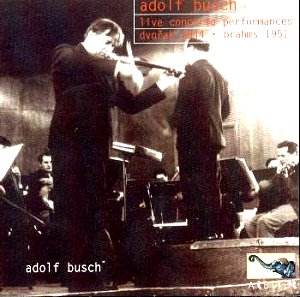Arbiter’s catalogue boasts a number of performances
by Busch and by his Quartet. This one collates two works closely associated
with him in live performances. The Dvořák
dates from 1944 in New York and the Brahms comes from Basel in 1951,
his last performance – increasingly ill he died the following year.
His Brahms was never recorded commercially but we now have two off-air
survivals; this and a Music and Arts William Steinberg led performance
from 1943. There is also a live Finale from a different performance
that was previously the only known example of his Concerto performances.
Note writer Tully Potter writes with predictable understanding about
Busch but his assertion that he was the Brahms’ Concerto’s "leading
exponent in the years between the Wars" can be taken with a pinch
of salt (Huberman? Kreisler?). A leading exponent, maybe.
I am a great admirer of Busch but this Brahms finds
him, as Potter admits, in decline. The sound quality is generally good,
a little muffled and with some acetate damage (there seems to have been
some little damage at 0.30 in the orchestral introduction but it passes
quickly) but quite sufficient to allow uninterrupted scrutiny of Busch’s
performance which differs markedly from that Finale performance and
from the swagger of the Steinberg 1943 performance. Hans Münch
(cousin of Charles) is a sympathetic accompanist but even he can’t prevent
Busch rushing his passagework in the first movement and the sense of
him jumping his bars. His playing from 10.30 is decidedly sketchy and
his technical frailties probingly apparent. It’s good to hear his own
first movement cadenza. The slow movement enshrines the carapace of
a once fine conception; the oboe solo is good, Busch making a couple
of quick and colourful slides but there is some lack of orchestral clarity
behind him and once or twice there is pitch distortion on the recording.
Busch’s once ebullient way with the Finale now sounds decidedly and
inevitably perhaps far more tired and effortful. He was always animated
and quick here and he’s still less then half a minute slower than the
Steinberg performance but here the tone takes on a slightly smeary and
artificial-sounding emotiveness.
The companion Dvořák
with Leon Barzin dates from the latter stages of the War. He had performed
a lot of Dvořák (but recorded only the Op. 51 Quartet) so it’s
certainly of major importance to hear his Concerto performance and in
such good sound. It’s a strong and forceful traversal but one
that remains unconvincing. His first movement sports some didactic passagework
and a distinct lack of plasticity of phraseology. There is too much
emphatic playing and, as with the Brahms, Busch is guilty of rushing
bars. As a result the opening movement for much of the time sounds rhythmically
jerky and casually eruptive, despite some delightfully emotive moments
from the soloist. As the movement develops one can however feel him
becoming more idiomatic even if the recording fails to flatter the famous
and much mused upon Busch tone. Barzin shapes the opening of the second
movement with real understanding but Busch does make some rather unlovely
sounds – his lower two strings are the main culprits – and his tone
tends to thinness. For all the occasional delight of his playing the
tonal and concomitant technical liabilities are too pronounced here.
The National Orchestral Association sounds bluff rather than inspired
in the opening of the finale and Busch seems to be tiring rapidly (there
is more evidence of technical limitations). Nevertheless the way he
varies his phrasing, keeping the lyric line constantly energised, is
treasurable even if his entry points are really very emphatic indeed.
The result is a fitful, not entirely cohesive performance.
The irony of the German Busch performing Dvořák
in New York in 1944 whilst the Czech Prihoda had slightly earlier recorded
it in Berlin won’t go unnoticed. Whatever ones position regarding the
moral implications involved these should remain independent of ones
judgement of the performances. The Brahms
is a study in decline and the Dvořák a most unusual, not entirely
successful, traversal. I would however strongly urge those interested
in Busch seriously to study the disc; what it discloses, even by default,
is of significance.
Jonathan Woolf
